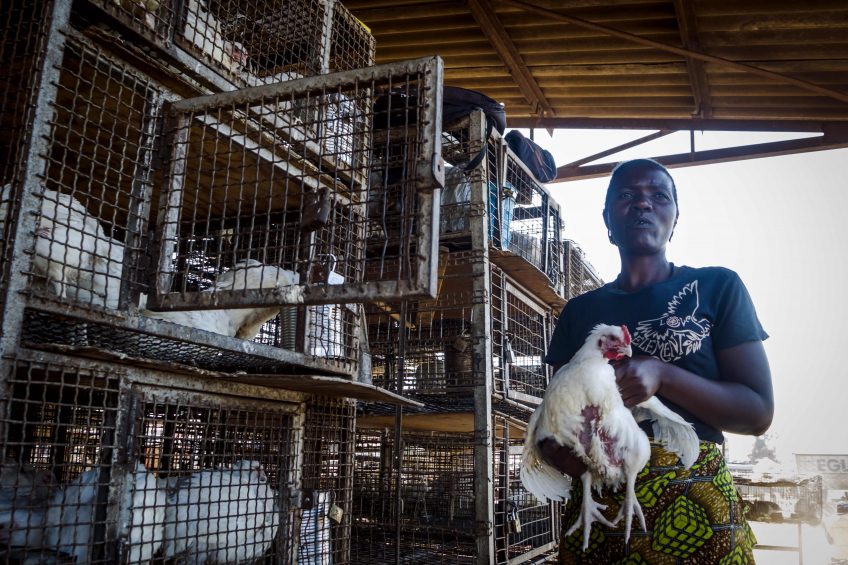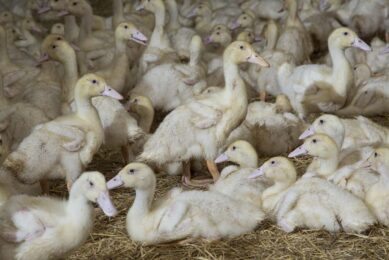Exports halted as bird flu hits 2 South African poultry farms

Exports of poultry and poultry meat have been halted from South Africa as the country tries to contain its first outbreaks of avian influenza in poultry.
The first case of H5N8 was found on a broiler breeder farm near Villiers, which is located on the border between the Free State and Mpumalanga.
About 30,000 birds culled
Around 30,000 birds are being culled on the farm, which sits near a river, meaning the virus was likely to spread to other farms.
Those fears were realised on Tuesday when a second case of the disease was detected on a commercial layer farm in Standerton around 65 kms from the first.
The Department of Agriculture, Forestry and Fisheries (DAFF) said that while the AI-infected poultry farm at Villiers and Standerton were wholly separate operations, the H5N8 strain had been confirmed on both.
14 day ban on sale and movement of birds
DAFF spokesperson, Bomikazi Molapo, said: “The nationwide ban on the movement and sale of live hens, including roosters, is still in place to enable the department to assess the extent of the outbreak.
“We will observe this ban for a period of 14 days and will reassess the situation. We have put this measure in place to prevent further unintended spread of the avian influenza.”
Exported poultry have been recalled
Following the first case, an executive at the South African Poultry Association (SAPA) said all poultry exports from South African had ceased immediately.
Dr Charlotte Nkuna added that all birds produced and exported 21 days prior to the date of discovery had to be returned to the country, and would most likely be destroyed.
Farmers carry the costs
Dr Nkuna said: “After it leaves our borders, the sanitary requirements cannot be guaranteed. Farmers carry the costs, as most of them do not have livestock insurance as it is expensive.
“Producers need to chlorinate and filter water from open water sources on their farms used to water their poultry, as this could have been contaminated with avian influenza through wild birds,” she added.
Poultry producers need to report high mortalities
Poultry producers were advised to report any higher than average mortalities in their flocks, as well as any higher than average water bird mortalities.

H5N8 found in Zimbabwe 2 months ago
This deadly strain of H5N8 started off in Europe primarily through wild birds and has been affecting poultry flocks for over a year. Around 2 months ago this strain was detected and isolated in neighbouring Zimbabwe.
Wild ducks the cause of the spread
It is now almost certain that wild ducks are spreading the disease and are already in the country. This has been established by research into the outbreak to find the origin of the pathogenic H5N8 strain of avian flu.
SAPA ceo Kevin Lovell said: “We are fairly certain there must be infected birds between the Vaal River and Zimbabwe. We are sure it’s from wild ducks, but we are just not sure which ducks.
“It was established that H5N8 bird flu is the same strain found in parts of Europe. This meant the ducks had migrated from Europe to the Western Cape, where they turn around and go back.
Check out the interactive Poultry Health Tool – with the latest insights on the 40+ most common poultry diseases.
“So there must be infected birds between Zimbabwe and the area of South Africa. They would have flown without stopping between central Zimbabwe to central South Africa.”
The ceo confirmed that bird faeces was already being sampled and added that although the disease was being spread by wild birds, it did not necessarily mean they would infect chickens.
He said: “The outbreak is in broiler breeders and they lay the eggs. There is no vertical transmission and no likelihood that any broiler chickens will have the virus.”
H5N8 can spread quickly
The Veterinary Authority has been to the farms and organised quarantine implementation, culling and the disinfection, according to SAPA.
The birds affected are only a small percentage of the total South African flock but this strain has been proven to move quickly once it takes hold unless good preventative measures are taken.
SAPA said that although bird flu has been found in ostriches before in South Africa it never had been found in poultry.
Join 31,000+ subscribers
Subscribe to our newsletter to stay updated about all the need-to-know content in the poultry sector, three times a week. Beheer
Beheer








 WP Admin
WP Admin  Bewerk bericht
Bewerk bericht